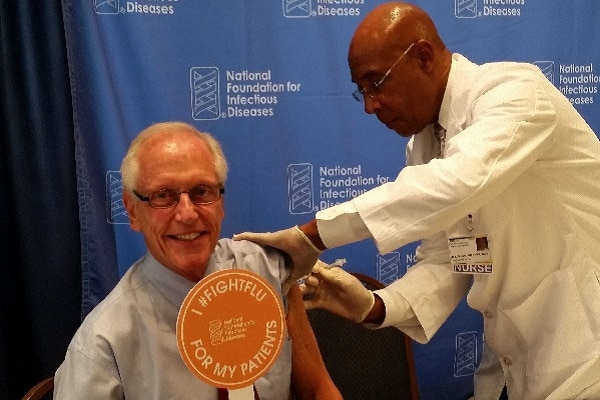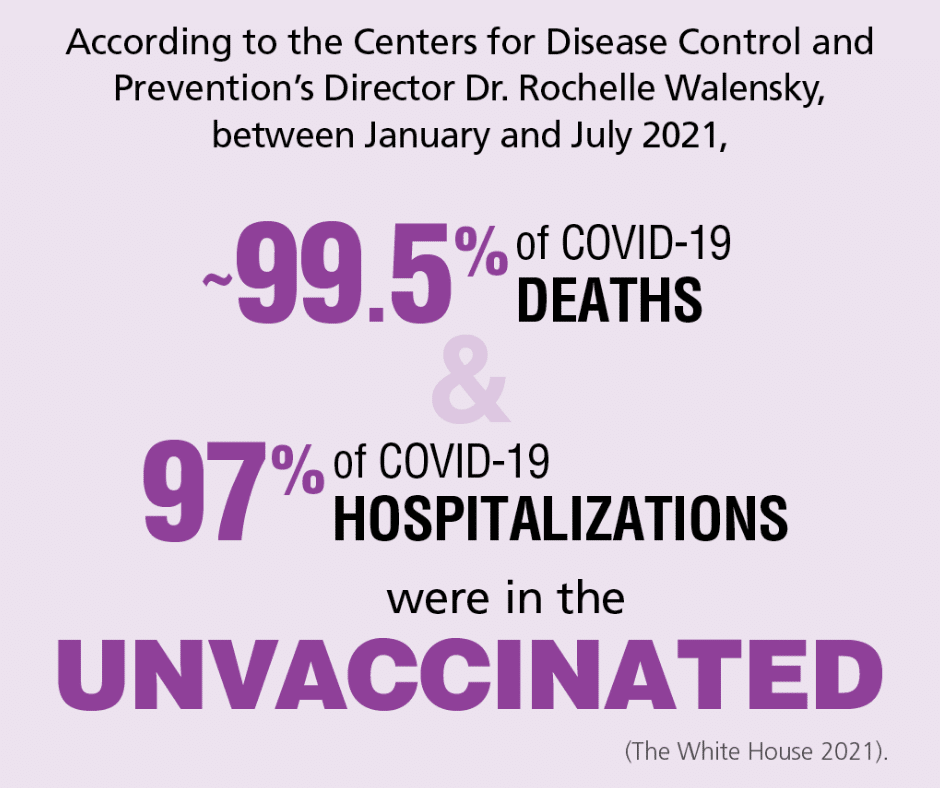
It’s flu season! To kick off National Influenza Vaccination Week (NIVW) and to help you learn more about how to prevent the flu, we talk with William Schaffner, M.D., medical director at the National Foundation for Infectious Diseases (NFID), for his expert insights.
Q: What has the 2017-2018 flu season been like so far? Has it been a “typical” season?
WS: According to the weekly FluView report, published by the Centers for Disease Control and Prevention (CDC), seasonal influenza activity has remained low overall in the U.S., but is increasing. Unfortunately, it is not possible to predict what this flu season (or any other) will be like. While it is certain that flu will spread every year, the timing, severity, and length of the season vary from one year to another, and no two flu seasons are alike.
The important thing to remember is that if you haven’t already, make sure you go out and get your flu vaccine before flu activity picks up in your community.
Q: For older adults, are there any updates on new types of shots/changes in the schedule?
WS: The recommendations and vaccines available for the 2017-2018 flu season are the same as last season. However, there are now two specially-designed vaccines approved for use in older adults ages 65 years and older aimed to provide a better immune response. The vaccines include a high-dose flu vaccine that has been available in the U.S. since 2009 as well as an adjuvanted vaccine that was approved for use in the U.S. during the 2016-2017 season.
Q: It seems like a basic question, but why should older adults get a flu shot each year?
WS: Flu vaccination is especially important to protect those at high risk of serious flu complications, including those ages 65 years and older. Older adults are six times more likely to die from flu and related complications compared to the general population. They are hospitalized at the highest rates of any age group and have an increased risk of bacterial lung infections, most notably pneumococcal disease. Even if they recover, older adults may never fully regain their pre-flu health and abilities, adversely impacting their lifestyle. In addition, influenza also increases the risk of heart attack by three to five times and stroke by two to three times in the first two weeks of infection, with the risks remaining elevated for up to three months. (To learn more about the impact of flu on older adults visit, www.nfid.org/flu/olderadults.)
Q: What do you tell people who might doubt the value of a flu shot?
WS: According to CDC, flu vaccination reduces the risk of flu illness by between 40-60 percent on average. Additionally, getting vaccinated can make flu illness less severe and lower your risk of hospitalization, heart attack, and death, among other serious complications.
Getting an influenza vaccine also helps protect others in your community by reducing transmission of flu. This is especially true for those at higher risk of complications from the disease, including infants younger than six months of age who cannot get vaccinated, but who can become seriously ill if they are infected.
Additionally, the flu shot cannot cause the flu! Flu vaccines are made with inactivated (or killed) viruses or with no flu vaccine viruses at all (recombinant vaccine). Flu vaccines are safe and effective and are the best way to help fight flu.

WS: Prevention is the first goal of medicine. If we can prevent disease, that is much better than diagnosing and treating it. This season, there has been a lot of discussion around development of a universal flu vaccine, which I am closely monitoring. Scientists have been working for many years to develop a flu shot that works better and lasts longer. But, unlike the very stable measles virus, influenza is a moving target since circulating flu strains may change each year. I am hopeful that a universal flu vaccine becomes available in the next few years as it would help eliminate some of the barriers associated with an annual vaccine.
Q: Beyond getting a flu shot, what are some tips you can give to help people avoid the flu?
WS: The single best way to prevent seasonal flu is to get vaccinated each year, but healthy habits can help stop the spread of germs that cause respiratory illnesses like the flu. Take the following steps to help prevent flu:
- Avoid close contact with sick people and stay home if you are sick.
- Wash your hands often with soap and water. If soap and water are not available, use an alcohol-based hand sanitizer that contains at least 70 percent alcohol.
- Clean and disinfect surfaces and objects that may be contaminated with germs like flu.
Q: If someone does get the flu, is there anything they can do?
WS: If you get the flu, call your health care provider who may prescribe antiviral drugs that can be used to treat your illness. Antivirals are prescription medicines (pills, liquid, or an inhaled powder) and are not available over-the-counter. Antivirals work best when taken within 48 hours of getting sick, but may still be beneficial when given later in the course of illness.
Antivirals can make flu illness milder and shorten the time that you are sick. They may also prevent serious flu complications. For people with high-risk factors such as asthma, diabetes, or chronic heart disease, treatment with an antiviral drug can mean the difference between having a milder illness versus a very serious illness that could result in a hospital stay.
To learn more about how flu prevention, visit www.nfid.org/flu.






